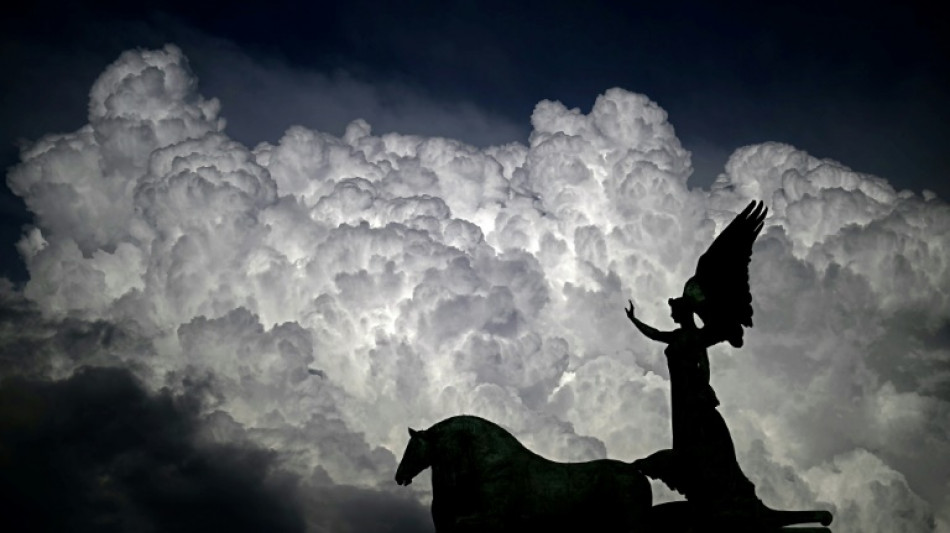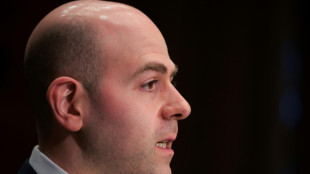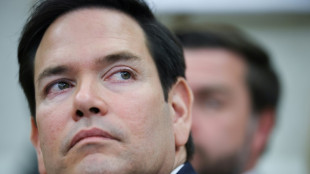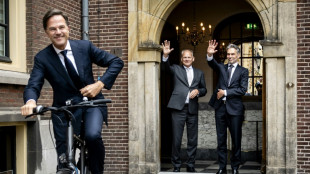
-
 Zuckerberg denies Meta bought rivals to conquer them
Zuckerberg denies Meta bought rivals to conquer them
-
Starc stars as Delhi beat Rajasthan in Super Over

-
 Weinstein asks to sleep in hospital, citing prison 'mistreatment'
Weinstein asks to sleep in hospital, citing prison 'mistreatment'
-
Amorim asks McIlroy to bring Masters magic to Man Utd

-
 Ruud keeps Barcelona Open defence on course
Ruud keeps Barcelona Open defence on course
-
Trump tariffs could put US Fed in a bind, Powell warns

-
 CONCACAF chief rejects 64-team World Cup plan for 2030
CONCACAF chief rejects 64-team World Cup plan for 2030
-
Putin praises Musk, compares him to Soviet space hero

-
 Son to miss Spurs' Europa League trip to Frankfurt
Son to miss Spurs' Europa League trip to Frankfurt
-
US senator in El Salvador seeking release of wrongly deported migrant

-
 Trump tariffs could put the US Fed in a bind, Powell warns
Trump tariffs could put the US Fed in a bind, Powell warns
-
US judge says 'probable cause' to hold Trump admin in contempt

-
 India opposition slams graft charges against Gandhis
India opposition slams graft charges against Gandhis
-
Nate Bargatze to host Emmys: organizers

-
 US Fed Chair warns of 'tension' between employment, inflation goals
US Fed Chair warns of 'tension' between employment, inflation goals
-
Trump touts trade talks, China calls out tariff 'blackmail'

-
 US judge says 'probable cause' to hold govt in contempt over deportations
US judge says 'probable cause' to hold govt in contempt over deportations
-
US eliminates unit countering foreign disinformation

-
 Germany sees 'worrying' record dry spell in early 2025
Germany sees 'worrying' record dry spell in early 2025
-
Israel says 30 percent of Gaza turned into buffer zone

-
 TikTok tests letting users add informative 'Footnotes'
TikTok tests letting users add informative 'Footnotes'
-
Global uncertainty will 'certainly' hit growth: World Bank president

-
 EU lists seven 'safe' countries of origin, tightening asylum rules
EU lists seven 'safe' countries of origin, tightening asylum rules
-
Chelsea fans must 'trust' the process despite blip, says Maresca

-
 Rebel rival government in Sudan 'not the answer': UK
Rebel rival government in Sudan 'not the answer': UK
-
Prague zoo breeds near-extinct Brazilian mergansers

-
 Macron to meet Rubio, Witkoff amid transatlantic tensions
Macron to meet Rubio, Witkoff amid transatlantic tensions
-
WTO chief says 'very concerned' as tariffs cut into global trade

-
 Sports bodies have 'no excuses' on trans rules after court ruling: campaigners
Sports bodies have 'no excuses' on trans rules after court ruling: campaigners
-
Zverev joins Shelton in Munich ATP quarters

-
 The Trump adviser who wants to rewrite the global financial system
The Trump adviser who wants to rewrite the global financial system
-
US senator travels to El Salvador over wrongly deported migrant

-
 UN watchdog chief says Iran 'not far' from nuclear bomb
UN watchdog chief says Iran 'not far' from nuclear bomb
-
Trump says 'joke' Harvard should be stripped of funds

-
 Macron vows punishment for French prison attackers
Macron vows punishment for French prison attackers
-
Canada central bank holds interest rate steady amid tariffs chaos

-
 Rubio headed to Paris for Ukraine war talks
Rubio headed to Paris for Ukraine war talks
-
Australian PM vows not to bow to Trump on national interest

-
 New attacks target France prison guard cars, home
New attacks target France prison guard cars, home
-
Global trade uncertainty could have 'severe negative consequences': WTO chief

-
 Google facing £5 bn UK lawsuit over ad searches: firms
Google facing £5 bn UK lawsuit over ad searches: firms
-
Onana to return in goal for Man Utd against Lyon: Amorim

-
 Tiktok bans user behind Gisele Pelicot 'starter kit' meme
Tiktok bans user behind Gisele Pelicot 'starter kit' meme
-
'Put it on': Dutch drive for bike helmets

-
 China's Xi meets Malaysian leaders, vows to 'safeguard' Asia allies
China's Xi meets Malaysian leaders, vows to 'safeguard' Asia allies
-
France urges release of jailed Russian journalists who covered Navalny

-
 Gabon striker Boupendza dies after 11th floor fall
Gabon striker Boupendza dies after 11th floor fall
-
UK top court rules definition of 'woman' based on sex at birth

-
 PSG keep Champions League bid alive, despite old ghosts reappearing
PSG keep Champions League bid alive, despite old ghosts reappearing
-
Stocks retreat as US hits Nvidia chip export to China


Clouds changing as world warms, adding to climate uncertainty
People have always studied the skies to predict the weather, but recently scientists have noticed that clouds are changing on a global scale -- posing one of the greatest challenges to understanding our warming world.
Some clouds are rising higher into the atmosphere, where they trap more heat. Others are reflecting less sunlight, or shrinking and allowing more solar energy to reach Earth's surface.
Scientists know this is affecting the climate, because the vital role that clouds play in warming and cooling the planet is well understood.
Recent research has shown that clouds -- or rather, a lack of them -- helped drive a stunning surge in record-breaking global heat over the last two years.
What is less certain is how clouds might evolve as the world warms. Will they have a dampening effect on global warming, or amplify it? And if so, by how much?
"That's why clouds are the greatest challenge. Figuring them out is -- and has been -- the big roadblock," said Bjorn Stevens from the Max Planck Institute for Meteorology in Germany, who has written extensively on the subject.
Cloud behaviour is notoriously complex to predict and remains a great unknown for scientists trying to accurately forecast future levels of climate change.
Changes in clouds could mean that, even with the same amount of heat-trapping greenhouse gas emissions, "we could get much more warming or much less warming", said Robin Hogan, principal scientist at the European Centre for Medium-Range Weather Forecasts.
"That's a big scientific uncertainty," he told AFP.
With satellites and supercomputers, scientists are improving cloud modelling and slowly filling in the missing pieces of the puzzle.
- Vicious cycle -
Part of the difficulty is that clouds are not uniform -- they act differently depending on their type, structure and altitude.
Fluffy, low-hanging clouds generally have a cooling influence. They are big and bright, blocking and bouncing back incoming sunlight.
Higher, streaky ones have a warming effect, letting sunlight trickle through and absorbing heat reflected back from Earth.
In recent decades, scientists have observed a growing imbalance between the amount of energy arriving, rather than leaving Earth, hinting at cloud changes.
As the climate has warmed, certain clouds have drifted higher into the atmosphere where they have a stronger greenhouse effect, said Hogan.
"That actually amplifies the warming," he said.
This is growing evidence that lower clouds are also changing, with recent studies pointing to a marked decline of this cooling layer.
Less reflective cloud exposes more of Earth's surface to sunlight and boosts warming in a "vicious feedback cycle", said climate scientist Richard Allan from the University of Reading.
In March, Allan co-authored a study in the journal Environmental Research Letters that found dimmer and less extensive low-lying clouds drove a doubling of Earth's energy balance in the past 20 years, and contributed to record ocean warmth in 2023.
A study in December, published in the journal Science, also identified a sharp drop in low-lying cloudiness as a likely culprit for that exceptional warming.
Stevens said scientists generally agreed that Earth had become less cloudy -- but there are a number of theories about the causes.
"Clouds are changing. And the question is how much of that change is natural variability -- just decadal fluctuations in cloudiness -- and how much of that is forced from the warming," he said.
- No smoking gun -
Another theory is that decades-long global efforts to improve air quality are altering the formation, properties and lifespan of clouds in ways that are not yet fully understood.
Clouds form around aerosols -- tiny airborne particles like desert dust and sea salt carried on the wind, or pollution from human activity like burning fossil fuels.
Aerosols not only help clouds take shape, but can make them more reflective.
Recent research has suggested that clean air policies -- particularly a global shift to low-sulphur shipping fuel in 2020 -- reduced cloud cover and brightness, inadvertently pushing up warming.
Allan said aerosols were one factor, but it was likely lower clouds were also "melting away" as the climate warmed.
"My feeling is there's a combination of things. It's never one simple smoking gun," he said.
New tools are chipping away at the uncertainty.
Last May, European and Japanese space agencies launched EarthCARE, a revolutionary satellite capable of capturing unprecedented detail of inner cloud workings.
In orbit it joins PACE -- a cutting-edge NASA satellite also studying aerosols, clouds and climate -- that lifted off just three months earlier.
Other recent innovations, including in machine learning, were helping "bridge the gap" in cloud understanding, said Kara Lamb, a research scientist and aerosols expert at Columbia University.
"We are seeing progress over time," she told AFP.
O.Schlaepfer--VB


